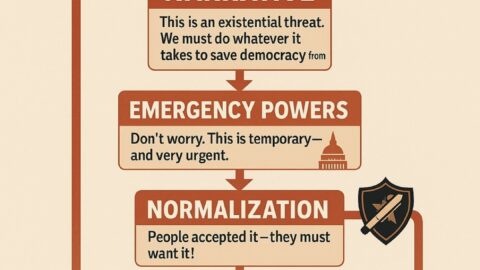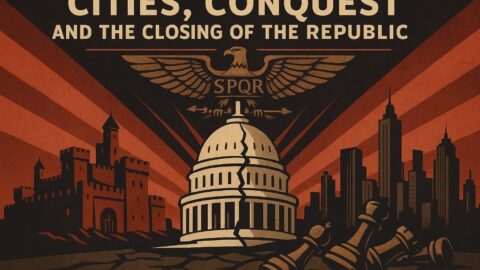A Warning to Modern Americans
Nearly one hundred years ago the Honorable Ambrose Rice spoke to a patriotic group, the Society of Cincinnati in Rhode Island. In his speech Rice warned about “influences and tendencies in [America] . . . that [threatened to] . . . weaken the stability [and] threaten the perpetuity of the principles upon which the republic was founded.” Rice also elaborated on the various ways that the Republic had by that time already been weakened in its Constitutional structure.
Rice first condemned those elements within the United States who had worked to weaken the republican character of the republic:
The conception of the framers of the Constitution was to establish a republic, not a monarchy, not an oligarchy, not a democracy. It was to be a republic in which the people were sovereign, indeed, in establishing the form of government, but a republic in which the people did not exercise the powers of government directly, but indirectly through their representatives. The processes of government were to be conducted by representation.
After elaborating on the advantages of a republican form of government he commented on the disadvantages of a government which had been weakened in its republican character. Thus, he began on the how. How the republic had been weakened. The first how was “the rise of party government.”
The rise of party government in the beginning of the last century brought about the first evasion of representative responsibility. The Constitution provided that the presidential electors, selected in the several states, should meet and vote by ballot for a President and a Vice-president of the United States. The purpose was clear that the choice of the Executive should be the result of the deliberations of this selected body of presidential electors. The exigencies of politics and the necessity for party control set at naught this judicious provision of the Constitution, and now for many decades it has been the people themselves in the several states that have impressed their choice upon the electors. This has been brought about by no change in the law. Repeated practice has established the precedent.
So, an attack had been made on how the Electoral College was to function. By the time of this speech, July 4th, 1924, one year shy of 100 years ago, it no longer functioned the way it was intended. However further encroachment was planned:
A further development of this same tendency is embodied in the frequently proposed amendment to the Constitution providing for the election of the Chief Executive of the nation by the direct popular vote of all the people of the United States, with state lines ignored and presidential electors abolished.
Fortunately, direct popular vote for Presidency was defeated. The trend or tendency towards direct democracy and away from republican or representative government succeeded however in the passage of the 17th Amendment. Public school textbooks thereafter lauded this development by such terms as the United States was “broadening democracy,” or “democracy was expanded,” and so forth. Rice elaborates:
in reference to the election of Senators of the United States . . . [they were] For more than a hundred years . . . chosen by the legislatures of the several states—that is, by the representatives of the people. But by the Seventeenth Amendment, a Senator of the United States is no longer chosen by the legislature but is elected by the direct vote of the people of each state. Thus again, that judgment and deliberation which should be exercised in such an important selection is transferred from those who are presumed to be more intelligent and informed, to the great mass of the general electors of a state.
The populist fad or trend continued with how state officers were to be chosen.
This drift from responsible representative government to popular appeal is also observed in recent state constitutions. It was the usual practice originally for the numerous state officers to be chosen either by the executive or legislative branch of government, as representatives of the people, but now the election of such officers is made directly by the people. The most important of these state positions are those of the judges of courts. In many of the states the judges of the highest tribunals are elected directly by the people, and not for life or during good behavior, but for a longer or shorter term of years. A judge upon the bench naturally desires to continue in such service, and however upright he may be, there will always exist, unconsciously perhaps, a human weakness to cater to the popular view in the administration of the law. Some of the ablest and soundest decisions of both the federal and state courts in highly important controversies have been at first received by the public with the greatest disapprobation. A judge in determining issues between litigants without fear or favor should be entirely free from every suspicion that he is courting popularity with the object of his own re-election in view. The judiciary should be entirely severed from political controversy and contention, and judges should be chosen by those best informed as to their character, natural ability and professional attainments.
The next two encroachments are related and similar, though separate.
Perhaps the greatest inroad upon representative government has been made in many of the middle and western states in the adoption of those faddish doctrines of the initiative and referendum. By these doctrines the people themselves directly initiate legislation and put their seal of approval or disapproval upon enacted statutes. These doctrines are direct negations of responsible representative government, and if they are carried to their logical conclusions would constitute a democracy in a state government where the federal Constitution guarantees a republican form of government. The purpose, no doubt, is to insure better legislative enactments, but that purpose should be accomplished by the election of intelligent and informed representatives, mentally qualified to perform properly the duties of their office. The initiative and referendum are manifestations of a spirit to reduce all government to the rule of the masses. They are inconsistent with and subversive of republican principles, . . .
But it got even worse.
This tendency to appeal directly to the popular vote is further illustrated by a proposition recently put forward . . . to take the sense of the American people at a referendum election, advisory to the government, to be held officially under Act of Congress . . . this is a proposal for a national plebiscite under federal control. If it is to be taken seriously and as not put forward for purely partisan purposes, the proposition is certainly amazing.
And worse.
The conception of seeking guidance and direction from public opinion, as expressed by the American electorate, is novel in American politics. To what lengths will responsible statesmen go to advance partisan interests among those who neither understand nor comprehend unconstitutional? There is a certain element of flattery in submitting such questions to the direct vote of the people in the implied assumption that they, the people, are better qualified to pass upon such questions . . . [but] the danger lies in its unquestioned advocacy of mass democracy.
The quality of the electorate was another danger warned about, especially that of illiteracy. An illiteracy of both an academic character and a political one.
When we consider the quality of our electorate, we will better comprehend the danger of this tendency to undermine republican principles. Who are our electorate? We must realize that we have pronounced racial complexities [here Rice is not talking about race as a skin color but race as a nation] in our population. For decades our gates were thrown open for the entrance of immigrants, with very slight restrictions. Our country seemed large enough to accommodate all that desired to come, and there were always those in the manufacturing centers who desired to obtain the benefits of cheap labor. It has been only recently that Congress has properly enacted immigration laws that bring wholesome restrictions and limitations. These laws were made necessary by the increasing numbers from Europe who sought to escape the burdens of the European war. But the percentage of our foreign born was already large. Hundreds of thousands of these immigrants neither speak nor read nor write the English language.
Historians are fond to talk about America as a melting pot, but it was not always so.
While illiteracy is widespread among the foreign born and among the native born in some sections of the country, there is another special danger which arises from radical segregation [again Rice is talking more about national origin not necessarily segregation by skin color]. In every large American city there are communities where only a foreign tongue is spoken. Washington cautioned against permitting immigrants settling in this country in a body, for “by so doing,” he said, “they retain the language, habits and principles which they bring with them. Whereas, by an intermixture with our own people, they or their descendants get assimilated to our customs, measures and laws; in a word, they soon become our people.”
Jefferson was of the same opinion. He wrote in 1817: “As to other (than English) foreigners, it is thought better to discourage their settling together in large masses wherein, as in our German settlements, they preserve for a long time their own language, habits and principles of government, and that they should distribute themselves sparsely among the natives for quicker amalgamation. English emigrants are without this inconvenience. They differ from us little but in their principles of government, and most of those who come here are sufficiently disposed to adopt ours.”
No nation can become a great nation unless in the main it is homogeneous, and all its people are conversant with one language and are inspired with an attachment and devotion to its institutions. How dangerous race consciousness is to our political structure may be illustrated by the fact that President Wilson alienated the vote of those of Italian descent in the important presidential election of 1920 by his attitude on a purely foreign question, the allotment of Fiume under the treaty of Versailles.
I heard a Marxist oriented professor in 1987, at what was then Southern Utah State College (SUSC) now known as Southern Utah University (SUU) cite the great benefits of our national character that would accrue if the country were more like that of a “salad bowl” and not a “melting pot.” And that progressives would work hard to make it happen. Rice, of course, as can be seen above differs.
Another area regarding immigration and naturalization is that of literacy. Or its opposite illiteracy.
Our naturalization laws are too liberal. The filing of a declaration of intent, the lapse of five years, and the answering of a few of the simplest questions will enable one foreign born to become an American citizen. That citizenship, which should be so highly prized, is frequently lightly regarded because of the readiness with which it is obtained. Last week seventy-five foreign born who had thus been admitted to citizenship in the Federal court at Providence were immediately conducted in a body by the sheriff to the office of registration at the City Hall, where, by merely giving their names and addresses and establishing their residence in this state for two years and in the city of Providence for six months, they became electors of this state, each with a vote equal to that of either of you.
Washington said, “In proportion as the structure of a government gives force to public opinion it should be enlightened.” If the tendency is to persist to resort more and more to an appeal to popular vote, it becomes the more essential that our electors, to whose judgment and discretion this appeal is made, should be men of education and understanding. They should at least read and write and speak the English language, and be able to follow the discussion of public affairs in the public press, and they should further possess at least that degree of information and learning which we require under the law for every child in the public schools. One cannot criticise a man of foreign birth for acquiring as easily as possible all the rights and privileges of American citizenship and of an American voter, but the blame is heavily upon us who permit the admission to the electorate of those who are not intellectually qualified. The State of Rhode Island and every other state, should have in its Constitution an educational test for prospective electors.
Sort of reminds one of today’s problems with immigration and naturalization–doesn’t it? Problems. Problems. Problems.
But how do we deal with these problems? By suggesting we amend the Constitution? Seems like that’s how they did it in Rice’s time. An amendment for every problem:
During the last ten years, four amendments have been adopted to the Constitution of the United States, and a fifth has been submitted by Congress to the legislatures of the state. This frequency of amendment is disturbing enough, but the nature of the amendments—I am speaking now of the nature of the power which these amendments involve—has brought about a constitutional revolution with respect to the relation of the federal to the state governments. Apart from the Civil War amendments which were hammered into the Constitution by the force of arms, more than a hundred years elapsed, from 1804 to 1913, without a change in our federal charter.
In other words, the number of proposed amendments was bad enough, but it was also “disturbing” by their character or nature. And what was this nature? It was the additional powers granted to the Federal Government.
During all that time there was supposedly a clear and fixed line of demarcation between the powers specifically conferred upon the national government by the Constitution and the rights and powers reserved by the several foreign states. Judges, statesmen and historians commented with pride upon the perfect adjustment between federal and state authority. To the national government had been conferred powers having to do with the general welfare of all the states. On the other hand, the states had reserved the control of their own local affairs. The chief among the powers reserved by the states in local self government was that known as the “police power,” which is a generic term applied generally to those laws relating to the conduct of the individual. For more than a century the Supreme Court of the United States had repeatedly asserted that the federal government had no police power conferred upon it by the Constitution. The last few amendments, however, or at least some of them, have distinctly conferred police powers upon the federal government. The amendments that have worked this change have not been strictly amendments to the Constitution, in the sense of amending or curing a fault in any portion of the Constitution, but have been new grants of additional powers to the federal government. This was true in reference to both the Eighteenth and Nineteenth Amendments, and is also true with reference to the proposed Twentieth Amendment, for the regulation of child labor. It now seems to be taken for granted that whatever transference of power to the federal government, the legislatures of three-fourths of the states may consent to, will be deemed by the Supreme Court of the United States as a constitutional transference. In other words the long established line of demarcation between the state and federal authority, which was so zealously guarded by the states up to our own day, now no longer exists, and our Constitution by the amending process is now subject to any change which the legislatures of three-fourths of the states may approve.
Finally, Rice warns us that voters need to be educated and informed:
One of the most threatening at the present time is our failure to adhere strictly to a representative form of government, and our tendency to adopt forms of a democracy in the determination of important issues. The electorate, as a whole, are honest and well-intending, but frequently the uninformed and the misinformed outnumber those who are intelligent and capable of forming just opinions. Our hope is in the education of the people, especially the electorate, to teach them the wiles of the demagogue, and the deceptions of a venal press, conducted for personal and partisan advantage. There is urgent need everywhere for the requirement of educational qualifications for prospective electors. Representative government can only be successful in so far as the electorate is intelligent. With an intelligent electorate the appeals of the demagogue will fall on deaf ears.
(“Tendencies in Representative Government,” by Hon. Ambrose Rice, A. M., L. S. B., Improvement Era, 1925, Vol. Xxix. November, 1925 No. 1. The Improvement Era was the forerunner of the Liahona magazine, published by the Church of Jesus Christ of Latter-day Saints.)







